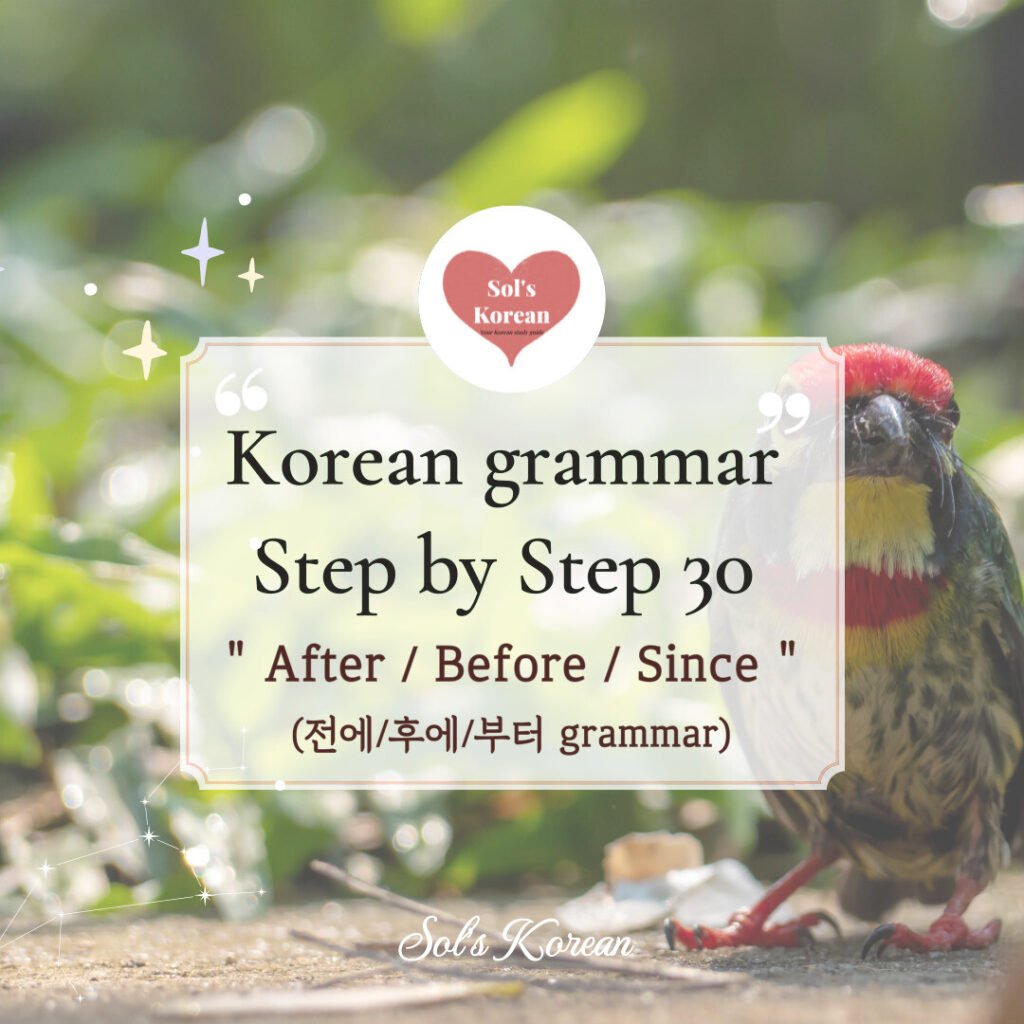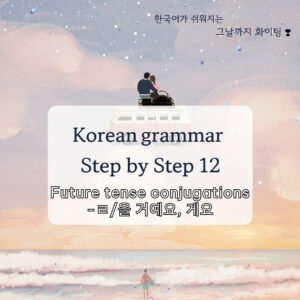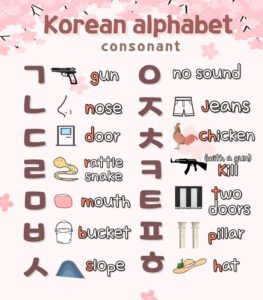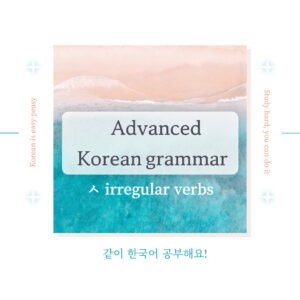전에, 뒤에, 후에 | Before, Ago, Since, After in Korean
Today, we’re going to learn how to express time concepts like Since, Before, Ago, and After in Korean! This grammar is simple and straightforward, so it should be easy to pick up—especially compared to our previous lesson (haha)!
Let’s dive into today’s class then!
Part 1,
Let’s grasp the concept of grammar
전에 : before, ago.
The word 전에 means ‘before’ or ‘ago.’ You can simply add 전에 after a noun.
Here are some examples:
Before the class: 수업 전에 (전에 goes after 수업(the class))
Before the vacation: 방학 전에 (전에 goes after 방학(the vacation))
2 weeks ago: 이주 전에
3 days ago: 삼일 전에
Just remember, 전에 always comes after a noun or time expression!
Now, if you want to say ‘before studying’ or ‘before eating’—so, ‘before‘ + a verb—
you’ll need to add -기 to the verb stem and then attach 전에.
Before eating : 먹다 + 기 전에 -> 먹기 전에
*Simply drop the 다 from the base verb form, then add 기 + 전에—no conjugation needed!
Before going : 가다 + 기 전에 -> 가기 전에
Before studying : 공부하다 + 기 전에 -> 공부하기 전에
🌱 More examples 🌱
먹기 전에 손 씻으세요🤲
Wash your hands before eating!
운동하기 전에 스트레칭을 꼭 하세요. (*꼭 means ‘for sure’ or ‘make sure’!)
Make sure to stretch before working out.
영화 보기 전에 팝콘을 샀어요.
I bought popcorn before watching the movie.
비 오기 전에 가자~.
Let’s go before it rains.
3개월 전에 한국어 공부하기 시작했어요.
I started learning Korean 3 months ago.
* To start doing something, we use -기 시작하다!
뒤에/후에: “after” or “in” (a certain period of time)
The words 뒤에 and 후에 both mean “after” or “in.” You can simply add 뒤에 or 후에 after a noun.
After the meeting: 회의 뒤에/후에 (뒤에 or 후에 comes after 회의 (the meeting))
After work: 퇴근 뒤에/후에 (퇴근 means “getting off work” and can be used as a noun.)
2 months later: 이개월 뒤에/후에
in 2 years: 이년 뒤에/후에
📌 Note: 뒤에 can also mean “behind”, but 후에 cannot!
* Behind you → 너 뒤에 ✅ (❌ 너 후에)
Behind the café → 카페 뒤에
Just like 전에, 뒤에 and 후에 always come after a noun or time expression!
Using 뒤에 / 후에 with Verbs
Now, if you want to say ‘after studying’ or ‘after eating’—so, ‘after‘ + a verb—
you’ll need to add -ㄴ/은 to the verb stem before attaching 뒤에 or 후에.
If the verb ends in a consonant → add “은”
If the verb ends in a vowel → add “ㄴ”
After reading: 읽다 → 읽은 후에 / 읽은 뒤에
(읽다 ends in a consonant, so we add 은 + 후에/뒤에.)
After arriving: 도착하다 → 도착한 후에 / 도착한 뒤에
(도착하다 ends in a vowel, so we add ㄴ + 후에/뒤에.)
* You can also use 고 as an alternative to express “after doing” something with verbs! *
🌱 More examples 🌱
책 읽은 후에 잘 거야. 📖😴 (책 읽고 also works!)
I’m going to sleep after reading a book.
도착한 뒤에 연락해 주세요. 📞 (도착하고 🙆♀️)
Please contact me after you arrive.
운전한 뒤에 피곤해서 바로 쉬었어요. 🚗😓. (운전하고 🙆♀️)
I was tired after driving, so I rested right away.
수업 들은 후에 도서관에서 공부할 거예요. 📚 (수업 듣고 🙆♀️)
I’m going to study at the library after class.
5년 뒤에/후에, 세상이 어떨지 모르겠어요.
I don’t know what the world will be like in 5 years.
2시간 후에/뒤에 데리러 와 줄 수 있어요?
Can you pick me up in 2 hours?
부터 : starting from, since
부터 means “since” or “starting from.” You can use it on its own or combine it with 전에 (before, ago).
Since yesterday: 어제부터
Since last year: 작년부터
Since then: 그때부터
5년 전부터 운전하기 시작했어요.
➡️I started driving five years ago.
3년 전부터 한국에서 살고 있어요.
➡️I’ve been living in Korea for three years.
나는 어렸을 때 부터 그림에 관심이 있었어.
➡️I’ve been interested in painting since I was a child.
We use -기 전부터 to emphasize “from before a certain point!”
네가 오기 전부터 공부하고 있었어.
➡️I had been studying since before you arrived.
그 영화 보기 전부터 재미있을 것 같았어.
➡️I thought that movie would be fun even before watching it.
비행기 예약하기 전부터 돈을 모으고 있었어.
➡️ They had been saving money since before booking the flight.
You can use -후로(부터) to indicate “since after”, and 부터 can be omitted in many cases.
Nouns + 후로부터 & Verbs + ㄴ/은 후로부터
한국에 온 후로부터 많은 친구들이 생겼어요.
➡️ Since I came to Korea, I’ve made a lot of friends.
그 사건 후로부터 그 사람 많이 달라졌어요.
➡️ Since that incident, he has changed a lot.
그 일이 있은 후로부터 나는 더 많은 시간을 혼자 보내고 있어요.
➡️ Since that incident (happened), I’ve been spending more time alone
걔를 처음 본 후로부터 걔만 계속 생각나요
➡️ Since I first saw him/her, I can’t stop thinking about him/her.
Part 2,
Practice making sentences
1. I usually buy (and go) a cup of coffee before heading to work.
(usually: 보통 / to head to work: 출근하다)
2. The criminal ran away before the police arrived.
(criminal: 범인 / to run away: 도망가다/ police: 경찰 / to arrive: 도착하다)
3. Before you leave, can you confirm the meeting time (for me)?
(to leave: 가다 / confirm: 확인하다 / meeting time: 회의 시간)
4. I like to sleep right after eating. I get too sluggish if/when I eat.
(right away: 바로 / to be sluggish: 나른하다)
5. Before I go on vacation, I need to wrap up a few projects
(to go on vacation: 휴가가다 / to wrap up: 마무리하다 / a few: 몇 )
6. I try to walk at least 30 minutes after (having) dinner.
(to walk: 걷다 / at least: 최소한)
7. Eating dessert just before (eating) a meal is a bad habit.
(just before: 직전에 / bad habit: 나쁜 습관)
8. Think twice before making that decision. You might regret it.
(to make a decision: 결정(을) 하다/ regret: 후회하다) *might: ㄹ/을 수도 있다.
9. After traveling a lot and meeting various people, I think my values have changed.
(various: 다양한 / values: 가치관 / to change: 바뀌다)
10. My life has really changed since(after) I met you.
(life: 인생 / to change: 바뀌다)
11. I liked you for a long time even before you liked me.
(for a long time: 오랫동안)
12. I’ve always wanted to be a pilot since I was young, and I finally achieved my dream.
(pilot: 파일럿 / to be young: 어리다/ finally: 마침내 / achieve: 이루다 / dream: 꿈)
Try these on your own first, before checking the answers!
These are the answers:
1. I usually buy a cup of coffee before heading to work.
보통 출근하기 전에 커피 한 잔 사서 가요.
• 출근하다 (to go to work) + 기 전에 (before) → 출근하기 전에! (Before heading to work)
• 잔 is a counter for cups, so we use a native Korean number with it~~
• 사서 가다 sounds more natural than just 사다 because it conveys the nuance of grabbing a coffee and going. Since buying and going are connected actions, we use the -아/어서 grammar pattern to show that one action naturally leads to the next.
2. The criminal ran away before the police arrived.
범인은 경찰이 도착하기 전에 도망갔어요.
• 도착하다 (to arrive) + 기 전에 (before) → 도착하기 전에! (Before the police arrived)
• 경찰 (the police) is a secondary/additional subject in this sentence, so we can only use the 이/가 particle. 경찰은 ❌ (incorrect).
3. Before you leave, can you confirm the meeting time (for me)?
가기 전에, 회의 시간 (좀) 확인해 줄 수 있어요?
• 가다 (to go, leave) + 기 전에 (before) → 가기 전에! (Before you leave)
• 확인하다 (to confirm) → Adding 주다 gives the nuance of “doing it for me”, and then we add ㄹ/을 수 있다 (can). → 확인하다 + 주다 + ㄹ 수 있어요 → 확인해 줄 수 있어요? (Can you confirm it for me?)
• We also commonly use the Konglish verb 컨펌하다 (to confirm) → 컨펌 해 주세요~ (Please confirm it for me.)
• In casual speech, 좀 is commonly used to mean “please” in a natural and friendly way.
4. I like to sleep right after eating. I get too sluggish if/when I eat.
밥 먹은 후에 바로 자는 거 좋아해요. 밥 먹으면 너무 나른해져요.
• 밥 먹다 (to have a meal) + 은 후에 (after) → 밥 먹은 후에! (After I eat)
• You can also use 밥 먹고, which has the same meaning! → 밥 먹고 자는 거 좋아해요.
• 바로 means “right away” or “immediately.”
→ You can also say 밥 먹은 직후에 (“right after eating”).
→ 직 adds the nuance of “right after” or “immediate” action.
• To express “becoming sluggish”, we use 지다 to indicate a change in state.
→ 나른하다 (to feel drowsy/sluggish) + 지다 → 나른해져요 (I become sluggish).
5. Before I go on vacation, I need to wrap up a few projects
휴가 가기 전에, 프로젝트 몇 개 마무리 해야 해요.
* A few / some → You can use 몇! When counting objects, use 몇 개 (a few/some things).
* 마무리하다 means to wrap up, to finish off.
To express “have to finish”, use -해야 해요 → 마무리해야 해요. (I have to finish it.)
– 내일까지 마무리해 주세요. (Please finish it by tomorrow.)
– 이제 마무리합시다. (Let’s wrap it up now.)
* 휴가 refers to a vacation for workers (직장인).
방학 refers to a vacation or break for students (school break).
6. I try to walk at least 30 minutes after (having) dinner.
저녁 먹은 후에 최소한 30분은 걸으려고 해요.
• You can also use 저녁 먹고, which has the same meaning!
• To express “try to,” we can use the ending -으려고 하다. 걷다 (to walk) is an irregular verb, so it changes
걷다 (걸어요) → 걸으려고 해요 (I try to walk).
7. Eating dessert just before (eating) a meal is a bad habit.
밥 먹기 직전에 디저트 먹는 것은 나쁜 습관이에요.
• To express “just before,” you can use 직전에.
• For “eating,” we use the -는 거 grammar structure!
8. Think twice before making that decision. You might regret it.
결정(을) 하기 전에 두 번(은) 생각해요. 후회 할 수도 있어요.
• You can add 은 after 두번 (twice) to emphasize. It can also mean “at least!”
– 두번은 가야 해요. (You should go at least twice.)
• Do you remember our lesson about can (ㄹ/을 수 있다)? If you add 도 after 수, it means “might”!
– 너가 좋아할 수도 있어. (You might like it.)
– 우리 아빠는 안 먹을 수도 있어. (My dad might not eat it.)
– 걔는 안 갈 수도 있을 것 같아. (I think he/she might not go.)
9. After traveling a lot and meeting various people, I think my values have changed.
많이 여행하고 다양한 사람을 만난 후에, 가치관이 바뀐 것 같아요.
• To connect verbs like “traveling” and “meeting,” you can use 고.
But using 면서(while) also sounds natural! 많이 여행하면서 다양한 사람을 만난 후에 (After meeting various people while traveling)
• To express “I think,” you can add -것 같아요! 바뀌다 + 것 같아요 becomes 바뀐 것 같아요.
10. My life has really changed since(after) I met you.
너를 만난 후로(부터) 내 삶이 많이 바뀌었어.
• Since after, we use 후로부터. 만나다 → 만난 후로부터. 부터 can be omitted!
11. I liked you for a long time even before you liked me.
너가 나를 좋아하기 전부터 오랫동안 너를 좋아했었어(casual)
• To express “even before,” you can add 부터 after 기 전 to emphasize “from before a certain point.”
12. I’ve always wanted to be a pilot since I was young, and I finally achieved my dream.
어렸을 때부터 파일럿이 항상 되고 싶었는데, 드디어 내 꿈을 이루었어요.
• Since I was young -> since when I was young, 어렸을 때(when I was young) + 부터(since) -> 어렸을 때부터
• 되고 싶었지만 works, but 는데 is more casual!
• 이루다 is active, meaning “to achieve.” For a passive form (e.g., “my dream has come true”), use 이루어지다.
– 내 꿈이 이루어졌어요! (My dream has come true!)
Great job! You’re getting closer to achieving your Korean goal!
✨😊
““Language is the road map of a culture. It tells you where its people come from and where they are going.”








